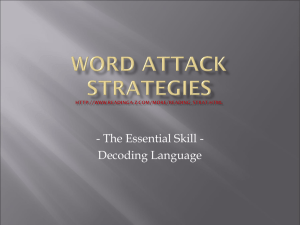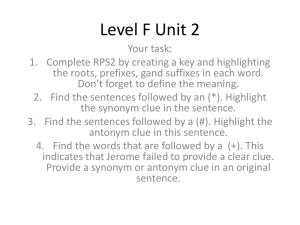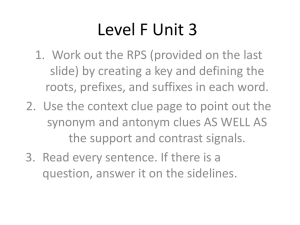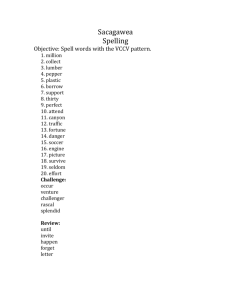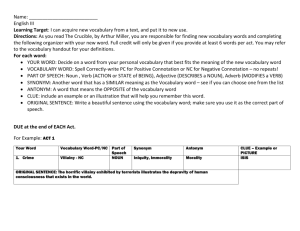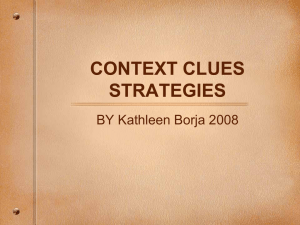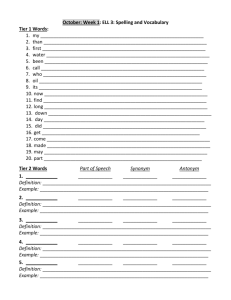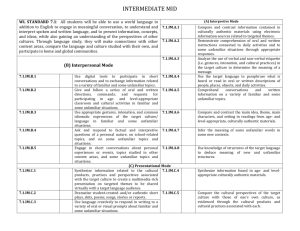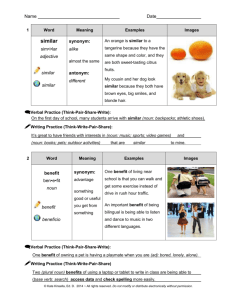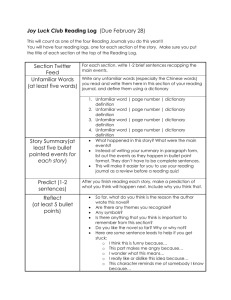Weekly Spelling Activities
advertisement
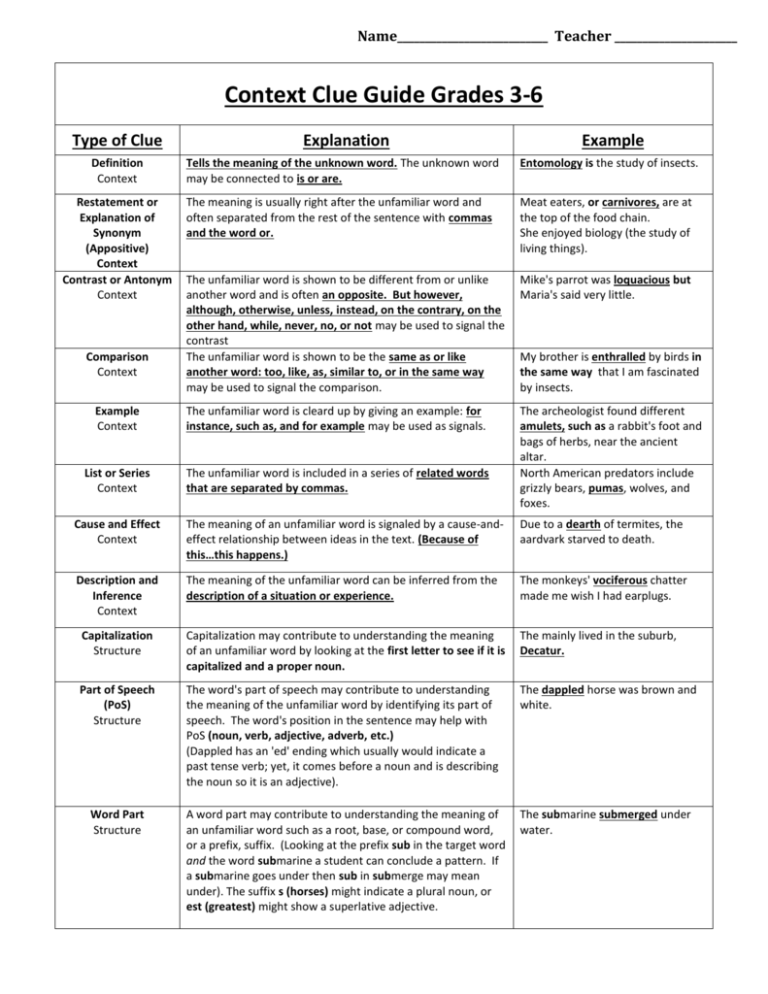
Name___________________________ Teacher ______________________ Context Clue Guide Grades 3-6 Type of Clue Explanation Definition Context Tells the meaning of the unknown word. The unknown word may be connected to is or are. Entomology is the study of insects. Restatement or Explanation of Synonym (Appositive) Context Contrast or Antonym Context The meaning is usually right after the unfamiliar word and often separated from the rest of the sentence with commas and the word or. Meat eaters, or carnivores, are at the top of the food chain. She enjoyed biology (the study of living things). The unfamiliar word is shown to be different from or unlike another word and is often an opposite. But however, although, otherwise, unless, instead, on the contrary, on the other hand, while, never, no, or not may be used to signal the contrast The unfamiliar word is shown to be the same as or like another word: too, like, as, similar to, or in the same way may be used to signal the comparison. Mike's parrot was loquacious but Maria's said very little. Example Context The unfamiliar word is cleard up by giving an example: for instance, such as, and for example may be used as signals. List or Series Context The unfamiliar word is included in a series of related words that are separated by commas. The archeologist found different amulets, such as a rabbit's foot and bags of herbs, near the ancient altar. North American predators include grizzly bears, pumas, wolves, and foxes. Comparison Context Example My brother is enthralled by birds in the same way that I am fascinated by insects. Cause and Effect Context The meaning of an unfamiliar word is signaled by a cause-andeffect relationship between ideas in the text. (Because of this…this happens.) Due to a dearth of termites, the aardvark starved to death. Description and Inference Context The meaning of the unfamiliar word can be inferred from the description of a situation or experience. The monkeys' vociferous chatter made me wish I had earplugs. Capitalization Structure Capitalization may contribute to understanding the meaning of an unfamiliar word by looking at the first letter to see if it is capitalized and a proper noun. The mainly lived in the suburb, Decatur. Part of Speech (PoS) Structure The word's part of speech may contribute to understanding the meaning of the unfamiliar word by identifying its part of speech. The word's position in the sentence may help with PoS (noun, verb, adjective, adverb, etc.) (Dappled has an 'ed' ending which usually would indicate a past tense verb; yet, it comes before a noun and is describing the noun so it is an adjective). The dappled horse was brown and white. Word Part Structure A word part may contribute to understanding the meaning of an unfamiliar word such as a root, base, or compound word, or a prefix, suffix. (Looking at the prefix sub in the target word and the word submarine a student can conclude a pattern. If a submarine goes under then sub in submerge may mean under). The suffix s (horses) might indicate a plural noun, or est (greatest) might show a superlative adjective. The submarine submerged under water. Weekly Vocabulary Homework Purpose: To be exposed to the spelling and meanings of new words. (Some of the vocabulary activities require a parent signature since there is no written product to turn in. I like to give students the opportunity to participate in such activities because not everyone learns best through paper and pencil assignments.) Due Date: Vocabulary homework is checked daily, but not collected until Friday. Please turn in all activities stapled. Monday: Using the sentences on the worksheet provided, apply your context clue knowledge to create a definition for the underlined word and write your definition on the worksheet. Some words will have more than one sentence due to their multiple meanings. You are responsible for knowing all meanings for all words. Make sure you follow all directions on the worksheet provided. Tuesday: Write all corrected definitions and part(s) of speech for your Wordly Wise words. To find the definitions, use your homework from last night that we corrected in class. (You do not need to include the words from our in-class practice.) Wednesday: Choose one vocabulary activity from the list below to complete for all Wordly Wise words. • Crossword: Create a crossword puzzle by hand or using a crossword creator online. The clue for each word should be its definition or a sentence that would lead someone to guess that word. • Synonyms/Antonyms: Using a thesaurus, find three synonyms and/or antonyms for each word. (Be sure to label if it’s a synonym or antonym.) • Drawings: Draw a picture for each word that shows its meaning. •Cartoon: Cut out a cartoon strip from a newspaper or create your own cartoon strip. Use your words in the captions. •Picture: Cut out a picture from a magazine, newspaper, etc. (or draw your own picture) and tell what is happening using your words. • Writing: Write a short story or newspaper article using the words. (Whatever you write must make sense.) • Movie Review: Create a movie review using your words. • Flash Cards: Create flash cards for each of the definitions. (This means that some words will have more than one flash card because of multiple definitions.) • Vocabulary Roll Game: Put the words in a hat. Pull a word out of the hat and roll a dice. Depending on what number you roll, do the following for the word: 1.) give a synonym; 2.) give an antonym ; 3.) define it; 4.) act it out; 5.) draw it; 6.) use it in a sentence. Repeat for all words (and their multiple meanings, if necessary.) (Parent signature required.) • Hand Movements: Come up with a hand movement for each word. (Parent signature required.) • Charades: Play a game of charades (silently acting out your words) with an adult and have them guess the words. (Parent signature required.) •Scenes: With an adult, brainstorm a situation in which each word can be used and act out the situation with them or for them. (Parent signature required.) •Concentration: Write your words on cards and their definitions on other cards. Turn all cards upside and play a matching game of concentration. (Parent signature required.) •Free Choice: Student-created activity that is previously approved by your teacher. Thursday: Write sentences for all words. Make sure your sentences contain context clues. For example: The famished man tore through the refrigerator looking for food. (Inference Context Clue) The man was famished. (No context given to tell the meaning of “famished.”)
